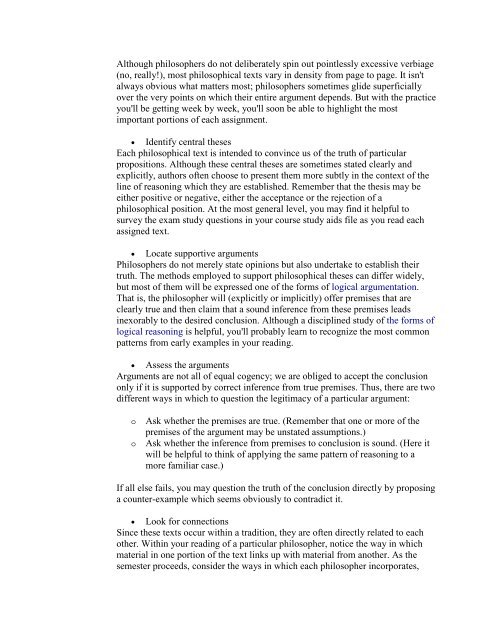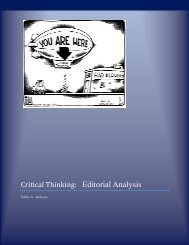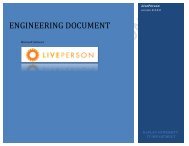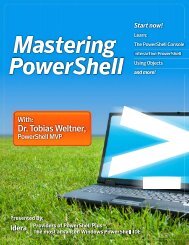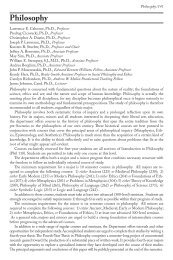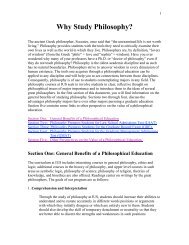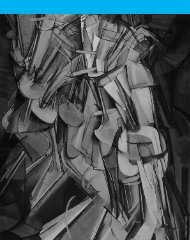Guide to the Study of Philosophy - Eddie Jackson
Guide to the Study of Philosophy - Eddie Jackson
Guide to the Study of Philosophy - Eddie Jackson
Create successful ePaper yourself
Turn your PDF publications into a flip-book with our unique Google optimized e-Paper software.
Although philosophers do not deliberately spin out pointlessly excessive verbiage<br />
(no, really!), most philosophical texts vary in density from page <strong>to</strong> page. It isn't<br />
always obvious what matters most; philosophers sometimes glide superficially<br />
over <strong>the</strong> very points on which <strong>the</strong>ir entire argument depends. But with <strong>the</strong> practice<br />
you'll be getting week by week, you'll soon be able <strong>to</strong> highlight <strong>the</strong> most<br />
important portions <strong>of</strong> each assignment.<br />
• Identify central <strong>the</strong>ses<br />
Each philosophical text is intended <strong>to</strong> convince us <strong>of</strong> <strong>the</strong> truth <strong>of</strong> particular<br />
propositions. Although <strong>the</strong>se central <strong>the</strong>ses are sometimes stated clearly and<br />
explicitly, authors <strong>of</strong>ten choose <strong>to</strong> present <strong>the</strong>m more subtly in <strong>the</strong> context <strong>of</strong> <strong>the</strong><br />
line <strong>of</strong> reasoning which <strong>the</strong>y are established. Remember that <strong>the</strong> <strong>the</strong>sis may be<br />
ei<strong>the</strong>r positive or negative, ei<strong>the</strong>r <strong>the</strong> acceptance or <strong>the</strong> rejection <strong>of</strong> a<br />
philosophical position. At <strong>the</strong> most general level, you may find it helpful <strong>to</strong><br />
survey <strong>the</strong> exam study questions in your course study aids file as you read each<br />
assigned text.<br />
• Locate supportive arguments<br />
Philosophers do not merely state opinions but also undertake <strong>to</strong> establish <strong>the</strong>ir<br />
truth. The methods employed <strong>to</strong> support philosophical <strong>the</strong>ses can differ widely,<br />
but most <strong>of</strong> <strong>the</strong>m will be expressed one <strong>of</strong> <strong>the</strong> forms <strong>of</strong> logical argumentation.<br />
That is, <strong>the</strong> philosopher will (explicitly or implicitly) <strong>of</strong>fer premises that are<br />
clearly true and <strong>the</strong>n claim that a sound inference from <strong>the</strong>se premises leads<br />
inexorably <strong>to</strong> <strong>the</strong> desired conclusion. Although a disciplined study <strong>of</strong> <strong>the</strong> forms <strong>of</strong><br />
logical reasoning is helpful, you'll probably learn <strong>to</strong> recognize <strong>the</strong> most common<br />
patterns from early examples in your reading.<br />
• Assess <strong>the</strong> arguments<br />
Arguments are not all <strong>of</strong> equal cogency; we are obliged <strong>to</strong> accept <strong>the</strong> conclusion<br />
only if it is supported by correct inference from true premises. Thus, <strong>the</strong>re are two<br />
different ways in which <strong>to</strong> question <strong>the</strong> legitimacy <strong>of</strong> a particular argument:<br />
o<br />
o<br />
Ask whe<strong>the</strong>r <strong>the</strong> premises are true. (Remember that one or more <strong>of</strong> <strong>the</strong><br />
premises <strong>of</strong> <strong>the</strong> argument may be unstated assumptions.)<br />
Ask whe<strong>the</strong>r <strong>the</strong> inference from premises <strong>to</strong> conclusion is sound. (Here it<br />
will be helpful <strong>to</strong> think <strong>of</strong> applying <strong>the</strong> same pattern <strong>of</strong> reasoning <strong>to</strong> a<br />
more familiar case.)<br />
If all else fails, you may question <strong>the</strong> truth <strong>of</strong> <strong>the</strong> conclusion directly by proposing<br />
a counter-example which seems obviously <strong>to</strong> contradict it.<br />
• Look for connections<br />
Since <strong>the</strong>se texts occur within a tradition, <strong>the</strong>y are <strong>of</strong>ten directly related <strong>to</strong> each<br />
o<strong>the</strong>r. Within your reading <strong>of</strong> a particular philosopher, notice <strong>the</strong> way in which<br />
material in one portion <strong>of</strong> <strong>the</strong> text links up with material from ano<strong>the</strong>r. As <strong>the</strong><br />
semester proceeds, consider <strong>the</strong> ways in which each philosopher incorporates,


